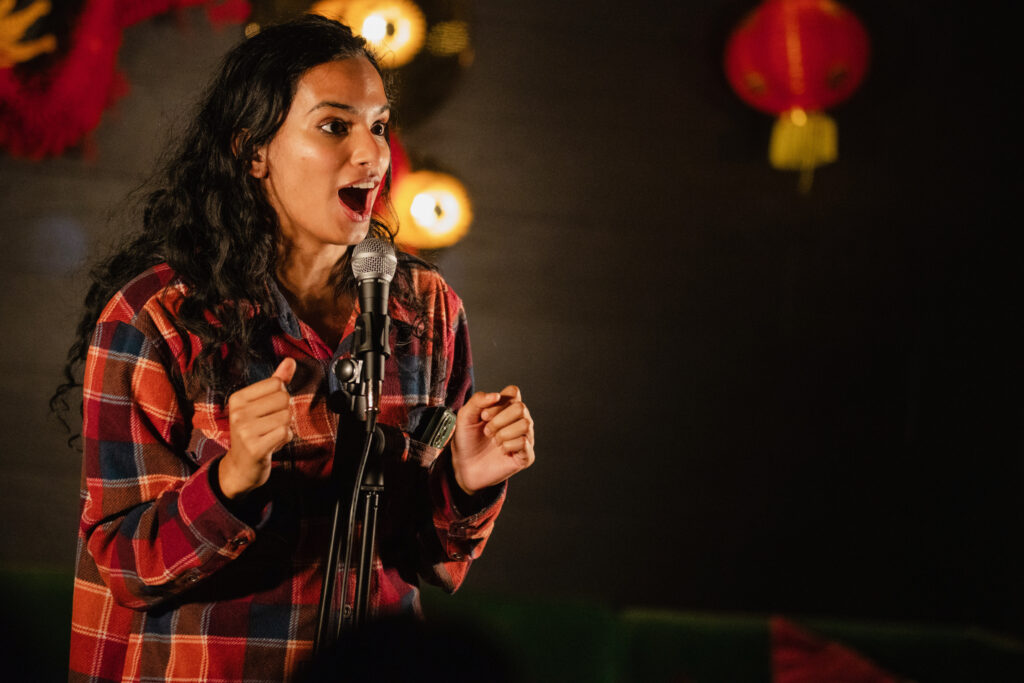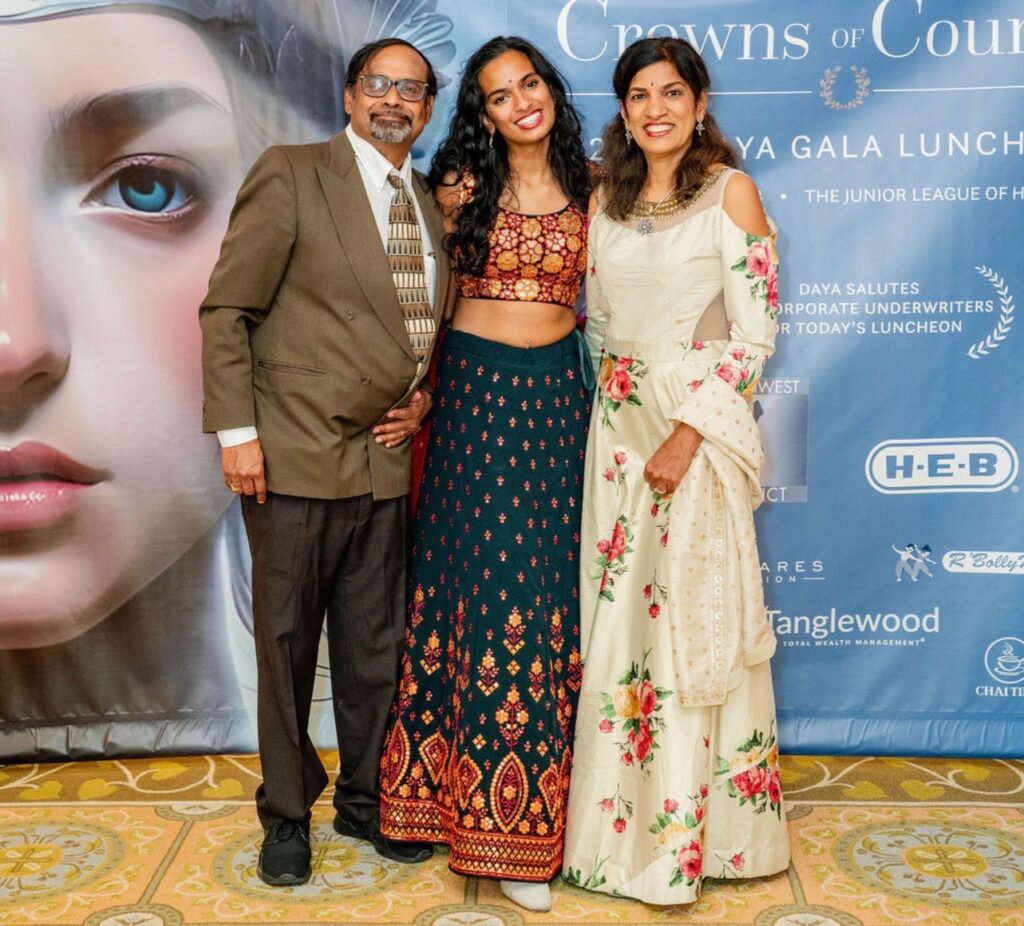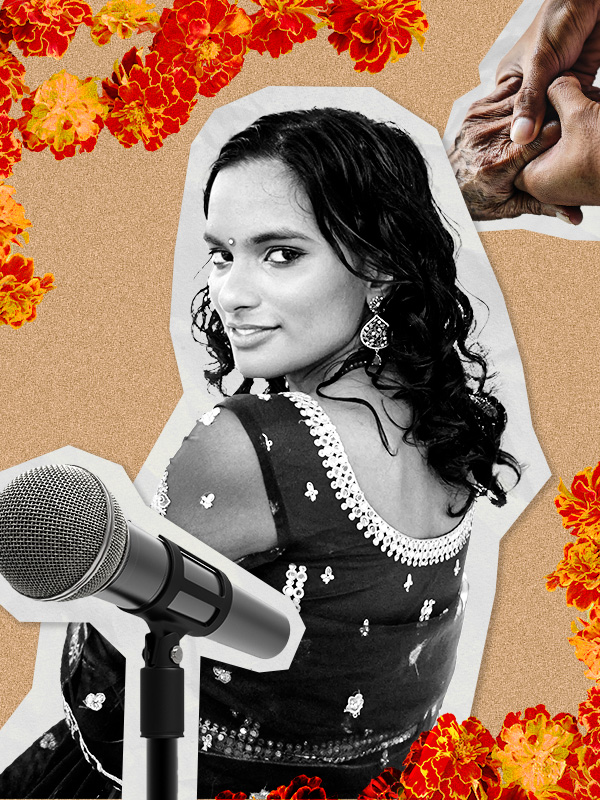Growing up, I always envied my peers whose doting grandmothers baked them cookies and knitted them sweaters. My paternal grandmother was capable of being affectionate. She would hug my cousins, kiss them and call them the apple of her eye.
But my patti, as we call them in Tamil, had different names for me, none of them quite as saccharine: rat, demon, water buffalo (I never understood that last one, but I found it extremely amusing).
My grandmother had a sort of twisted hyperfixation on me for a long time, which meant I was only to be criticized and not coddled or praised. Now that I’m in my late 20s, I see that it’s because I was everything she thought a woman shouldn’t be.
On both sides of the family, I have a combined 31 cousins. I have the darkest skin and the curliest hair, dominant genetic traits that somehow evaded the entire rest of the family. My grandma was perplexed by my appearance, missing no opportunity to remind me how hideous I was.
My personality also offended her. I was a rambunctious kid who didn’t adhere to any expectations set for me. I refused to wear traditionally feminine clothes (Indian and otherwise). I played for hours in the sun just to get 10 shades darker because I relished making the older women in my family angry. And I always talked back.

Though my mother is not nearly as outspoken as I am, she has a quiet dignity I’ve always admired and tried to mimic. In Indian culture, as in many societies, the responsibility of paying for a wedding fell squarely on the bride’s family. My grandfather’s friends reiterated to him that he shouldn’t waste money on also educating all of his daughters (my mother was one of six girls and four boys), only marrying them off as soon as possible. My grandfather, though traditional and staunch in his beliefs in many other aspects, disagreed fiercely. He told his daughters that education was a means of financial independence and therefore freedom. He gave them an opportunity that so few women in those days had. My mom went to medical school at a time when it wasn’t uncommon but still a burgeoning and largely progressive concept in South India. When time came for her arranged marriage, her family introduced her to six different men. Of those men, my father (smitten with her from the moment they met) was the only one who was enthusiastic about her college degree and told her that he didn’t expect her to be a stay-at-home mother.
Being raised by these parents made me allergic to archaic gender norms. Though I watched so many other parents (of family and friends) pressure their children to be obedient, to get married, to dress modestly and to not date in high school, mine were never quite that traditional. My parents always encouraged us to challenge their perspective, even if it was to their own detriment at times. My mom, who had watched many of her own family and friends be married off so young to abusive and/or alcoholic men, encouraged my sister and I to only marry someone if we were absolutely sure we wanted to spend the rest of our lives with them. “What if I never find someone like that?” I asked her once. “That’s totally ok, as long as you’re happy” was her reply.
Growing up in a loving, accepting environment gave me the emotional fortitude to become a relatively successful stand-up comedian. Though the decision to not go to grad school initially caused a riff in my relationship with my parents, we slowly but surely worked through it (after a my brief stint in a mental hospital after a mental breakdown) and became closer as a result. I even wrote about it for Malala Yousafzai’s newsletter!
For so many years of my comedy journey, I was the youngest one, the only woman or the only person of color in a room full of comedians. A lot of times, I was all three. I’ve toured all over the world, met so many of the people who inspired me to pursue this profession, and sell out 95 percent of my shows in every city. I take great pride in my body of work and the odds I overcame to get to where I am.
My grandmother, however, has berated me for the better part of the last decade to learn how to cook “for my husband and kids.” She encourages my cousins and I to “not burden our partners with our feminine emotions.”
And it’s not just her. Every FaceTime call with a relative abroad goes the same way. “How are you? When are you getting married?” Is that the only thing that matters to them? When I was in India for my cousin’s wedding, I hugged him and told him how happy for him I was. Several aunts pulled me aside and told me I shouldn’t flirt with him like that. It was then that I realized that so many people who I thought loved and cared about me saw me as nothing more than a vessel of sexuality and child-rearing, not as a person with complex emotions and who was capable of familial love. They didn’t care that he was an older brother figure to me my whole life. I was a woman and within his reach, which must mean I was trying to seduce him.
At Thanksgiving dinner last year, my grandmother lectured me for breaking up with my boyfriend because he wasn’t romantic enough. I was told that women these days are too high-maintenance. I clenched my fist and resisted to urge to lecture back about third-wave feminism.
Two decades worth of resentment built up inside of me like an emotional pressure cooker. I was so ashamed to be related to her: the colorism, the sexism, the religious bias and casteism that’s rife in our family, calling me ugly from when I was a child, telling me I’m useless and unmarriagable. One day, I exploded to my mother. “I’ve had enough of it. I refuse to be around her anymore, and if I have to be then I’m just not interacting with her.” My mom calmly asked me a simple question. “Have you ever tried empathizing with someone who was raised under such different circumstances?”

My grandmother was married off to my grandfather when she was 14 and he was 20. It was customary for child brides in rural India of the 1950s to live with their parents until they got their first period, after which they’d move in with their husbands.
All my life, I could never imagine how it would have been to be married at such a young age to a full-grown adult. For the first time, I really tried. My grandmother had her first period and, the way the story was told to me, didn’t even have a second one before she got pregnant for the first time at 16. She had five kids back to back by age 23 (my dad was number four).
At 14, I was starting high school and having crushes on boys who were too out-of-my-league to ever reciprocate. I was passing secret notes back and forth with my best friend in English class. I was getting into screaming matches with my parents for not letting me go to the mall with my friends. Not a single decision I made at age 14 has followed me to the age of 26.
One day when I was hanging out with my family, I forced them all to sit down and asked them what their lives were like before the kids, grandkids, nieces and nephews. “Did you date anyone before you got married to your current husband or wife?” My uncles giggled and shared mischievous young love stories of sneaking away to hook up with school crushes and stringing along different girls before marrying the girl their parents wanted them to marry.
I looked at the women in the room. They wore vacant expressions. “No,” they told me.
I asked another question: “When was the first time you had alcohol?” One of my uncles snuck into his father’s liquor cabinet with his friends when he was 16. Another uncle told a captivating story about intentionally getting drunk to eat meat for the first time because he hated the smell and taste. I looked at my female relatives again. “We’ve never drank alcohol in our lives,” they said, practically in unison.
As the men shared more stories of rebellion and youth, everyone else just sat there laughing along but not being able to relate. After two hours, I turned to the women and asked the question I had been itching to ask all night, maybe even all my life: Why? Why didn’t you drink or smoke or kiss boys? Why didn’t you enjoy being young? Why didn’t you dream bigger than the kitchen or the sari you would wear to your wedding?

My grandma piped up (from the kitchen, ironically). “As women, your relatives and I have duties and expectations that men aren’t beholden to. We’re expected to cook and clean and raise the kids and set a good example. We don’t have time for shenanigans like that.” Everyone in the room nodded.
I was shattered. For just a moment, I no longer saw her as an annoying regressive family member whose sole purpose in life seemed to be irritating the fuck out of me. I saw her as a young girl with hopes, dreams and ambitions beaten out of her by a society that devalued her. I wondered if I would get along with her when she were my age, if I told her the world was more than just how “marriagable” she was.
“I’m so sorry,” I said. My grandmother was confused by the sentiment. She said, “We have no regrets. That’s just how life goes. My marriage and my kids are the best thing to ever happen to me!”
If that was the case, who was I to take away her agency by feeling sad on her behalf? I wondered if she was actually content with those things or if she convinced herself to be happy because she had no other option.
Then, I questioned myself. Is it judgmental to think that’s she’s lying to herself because I would have felt imprisoned by her experiences? Could and should I take her words at face value?
As hard as I try, my empathy only seems to extend so far. The generational expectations of women in South Indian families are largely the same: I need to get married—and it needs to be to a man from a good family (meaning light-skinned, Tamil and upper-caste).
I know the expectations, but we don’t have to continue them. If my grandmother was suffocated under the crushing weight of double standards and heightened expectations, I wondered why she’d want me to suffocate, too. If my grandmother was traumatized by adults commenting on her skin color and weight and forcing her into marriage, wouldn’t she want to protect the next generation and not perpetuate those pressures? Why does she not want to break the cycle of suffering?
I’ll probably ask myself these questions for the rest of my life. But these days every time I get frustrated with my grandma, I take five deep breaths and try to think of who she might have been, before she was told who she had to be. And that will have to do for now.
This feature is part of The Village Issue. Read more about the gamut of our most cherished relationships here.







